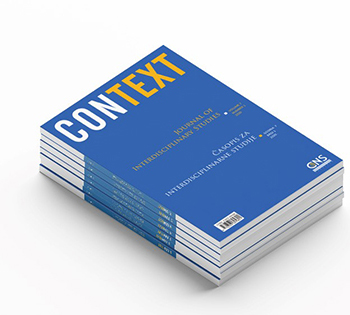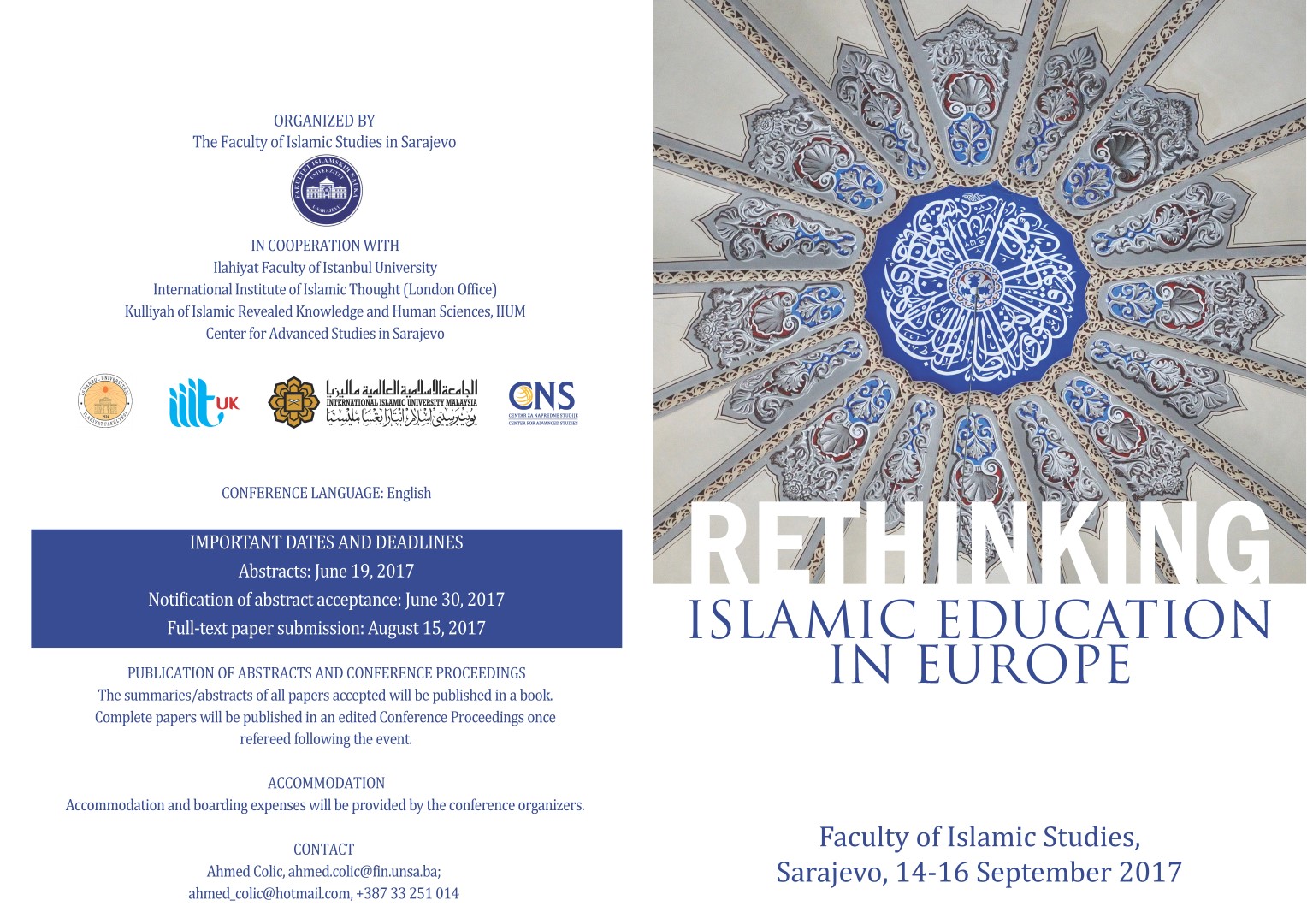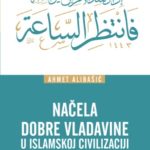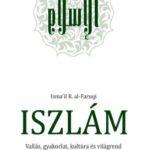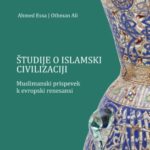The Muslim presence in Europe presents a positive opportunity for a contemporary Europe with global and cosmopolitan ambitions. European Muslim communities add diversity and skills to European society and also strengthen Europe’s relations with the outside world. However, their presence has also stirred a climate of fear, with, as a result, demands for accommodation at both Muslim and non-Muslim levels.
RETHINKING ISLAMIC EDUCATION IN EUROPE
Conference
Faculty of Islamic Studies, Sarajevo, 14-16 September 2017
Islamic Education in Europe: Future Opportunities
The Muslim presence in Europe presents a positive opportunity for a contemporary Europe with global and cosmopolitan ambitions. European Muslim communities add diversity and skills to European society and also strengthen Europe’s relations with the outside world. However, their presence has also stirred a climate of fear, with, as a result, demands for accommodation at both Muslim and non-Muslim levels.
Islamic education in Europe shares the same fate. Whilst it has the potential to play a positive role and be a catalyst for mutual understanding and accommodation, it can however also fail in this regard if its content and methods are not contextualized and it becomes instead a source of misunderstanding. The “Rethinking Islamic Education in Europe” conference aims to explore the place of Islamic education in Europe with respect to how it can critically realise its current and future positive potential as well as the ways, means and processes by which it can evolve both intrinsically in its various forms and externally at various levels across European society.
The main aim of the conference is to bring scholars, researchers, educators, professionals and other stake holders together to discuss issues, challenges and opportunities in Islamic Education within the European context. The event also aims to explore conceptions and goals of Islamic Education, the status of Islamic Education in Public Educational Institutions, forms of formal, non-formal and informal Islamic Education in Europe, and to further innovation in Islamic Education learning and teaching.
The Conference is being organized by the Faculty of Islamic Studies in Sarajevo in cooperation with the Ilahiyat Faculty, Istanbul University, the International Institute of Islamic Thought (London Office), Kulliyah of Islamic Revealed Knowledge and Human Sciences, IIUM and the support of the Center for Advanced Studies in Sarajevo.
The Conference will be held in English.
Conference Themes
Paper proposals should address one of the following themes below. Other relevant papers of good quality may be considered.
Theme I: History, Conceptions and Goals of Islamic Education in Europe
Issues to be discussed
- Historical background of Islamic Education in Europe
- Islamophobic/Divisive vs. Romantic Approaches;
- Islam as faith, culture, history, and civilization
- Islam as World/Global History
- What is Islamic Education?
- Theological education vs. religious studies approaches
- Normativity and normative approaches in Islamic Education
Theme II: Contents of Islamic Education and European Cultures
Issues to be discussed
- What are we teaching when we are teaching Islam?
- Multiculturalism, inclusion, etc.
- Comparative perspectives with other faith-based education models
- Interfaith education and comparative religions perspectives
- Islamic Education and Cultural learning/integration
- Place of/for Islam in European history
- Security issues and concerns in Islamic education
- History of religion and comparative religions approaches to teaching Islam in public education vs. Faith-based approaches
Theme III: Islamic Education in Public Educational Institutions
Issues to be discussed
- Stakeholders
- State policies
- Providers
- Students
- Teaching materials
- Teachers
- Orientations
- Employability
- Curricula
Theme IV: Formal Islamic Education in Europe (Pre-school, Primary, Secondary, Madrasa, and Higher Islamic Community Education)
Issues to be discussed
- Stakeholders (Muslim communities; governments; security establishments, etc.)
- Providers
- Students
- Curricula
- Teaching materials
- Teachers
- Study programs
- Skills
- Orientations
- Trends
- Employability
Theme V: Non-formal and Informal Islamic Education in Europe
Islamic Vocational Education, Islamic Education and Media, Da’wah and Educational Activities for targeted population – students, socially excluded persons, prisoners, NGOs in the context of Non-formal and Informal Islamic Education, …
Issues to be discussed
- Stakeholders
- Regulatory Frameworks
- Providers
- Students
- Curricula
- Teaching materials
- Teachers
- Orientations
- Trends
Theme VI: Pedagogical Framings of Islamic Education in Europe
Issues to be discussed
- Innovation and Change in Islamic Education
- Islamic Educators Competencies and Learner Needs
- Education Learning Environments
- Theoretical vs Practical Approaches
- Teaching methods
- Incorporating latest scholarship in Islamic Education
- Muslim and non-Muslim teachers of Islamic education (subjectivity vs. objectivity)
Important Dates and Deadlines
Abstracts: June 19, 2017
Notification of abstract acceptance: June 30, 2017
Full-text paper submission: August 15, 2017
Publication of Abstracts and Conference Proceedings
The summaries/abstracts of all papers accepted will be published in a book. Complete papers will be published in an edited Conference Proceedings once refereed following the event.
Accommodation
Accommodation and boarding expenses will be provided by the conference organizers.
Contact
Ahmed Colic, ahmed.colic@fin.unsa.ba, ahmed_colic@hotmail.com, +387 33 251 014

